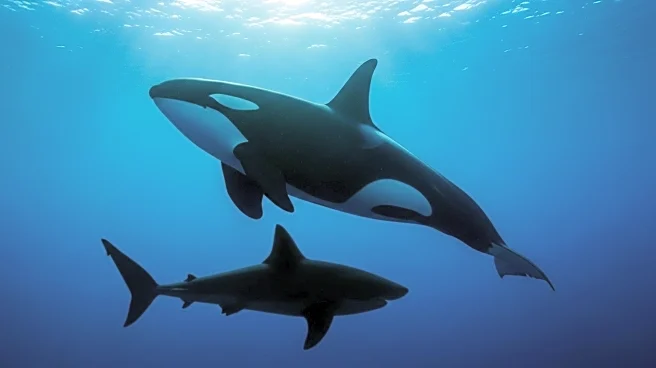What's Happening?
In a significant shift in marine dynamics, orcas, also known as killer whales, are increasingly preying on great white sharks, challenging their status as apex predators. This development was notably observed in Australian waters, where a great white shark carcass was found with its liver and other organs removed, a precision attributed to orca predation. Genetic evidence confirmed orca involvement, marking the first such documented case in Australia. Orcas are known for their intelligence and strategic hunting methods, targeting the energy-rich livers of sharks, which are high in lipids. This behavior has been observed in other regions, such as South Africa and California, where orca presence has led to a decline in great white shark sightings and altered marine ecosystems.
Why It's Important?
The rise of orcas as a rival to great white sharks could have profound implications for marine ecosystems. As apex predators, great white sharks play a crucial role in regulating the populations of their prey, such as seals and fish. A reduction in shark numbers due to orca predation could disrupt these balances, potentially leading to overpopulation of certain species and altering food webs. This shift in predator dynamics highlights the complex interdependencies within marine environments and underscores the potential for cascading ecological effects. The situation also raises questions about the adaptability of marine species to changing predator-prey relationships and the long-term impacts on biodiversity.
What's Next?
The ongoing monitoring of orca and shark interactions will be crucial to understanding the full impact of this predator shift. Researchers are likely to focus on the frequency and geographic spread of orca predation on sharks to assess its broader ecological consequences. Conservationists and marine biologists may advocate for protective measures to ensure the stability of affected ecosystems. Additionally, further studies could explore the adaptability of great white sharks to these new threats and the potential for shifts in their behavior or migration patterns. The findings could inform future marine conservation strategies and policies.
Beyond the Headlines
This development also touches on broader themes of environmental change and species adaptation. The ability of orcas to challenge great white sharks reflects their intelligence and adaptability, traits that may become increasingly important as marine environments face pressures from climate change and human activities. The situation serves as a reminder of the dynamic nature of ecosystems and the need for ongoing research to anticipate and mitigate unforeseen ecological shifts.











